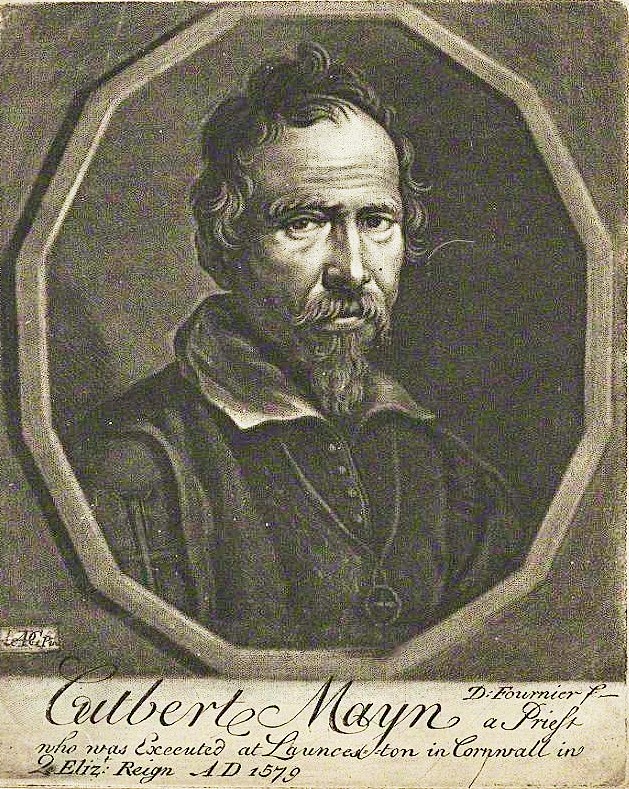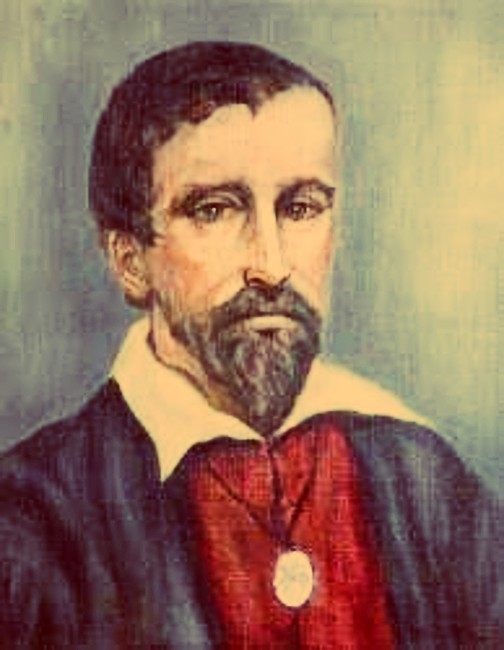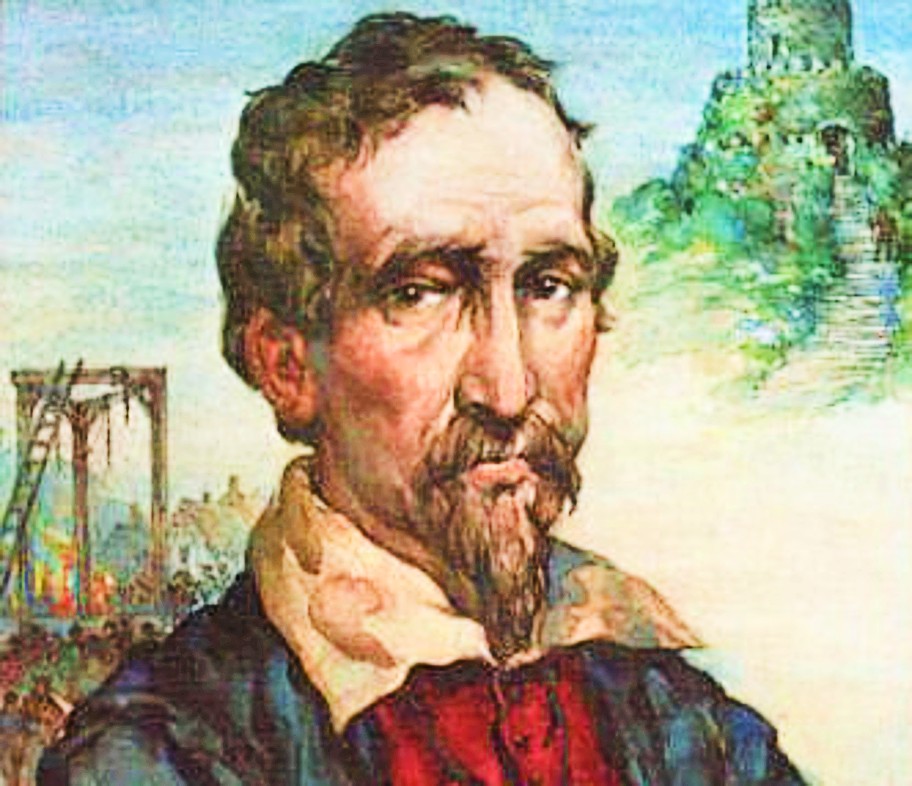Saint of the Day – 30 November – Blessed Cuthbert Mayne (1544-1577) Priest Martyr Born in 1544 at Youlston, Devonshire, England and died at the age of 33, by being hanged, drawn and quartered on 30 November 1577 at Launceston, Cornwall, England. Additional Memorials – • 25 October as one of the Forty Martyrs of England and Wales, • 29 October as one of the Martyrs of Douai, • 1 December as one of the Martyrs of Oxford University.
The son of William Mayne, Cuthbert Mayne was born at Youlston, near Barnstaple in Devon and was Baptised on 20 March 1543/4 – the feaast of St Cuthbert. His uncle was a minister of the Church of England and the family expected the good natured Mayne would inherit his uncle’s rich church. This uncle paid his way through Barnstaple Grammar School and he was ordained a Protestant minister at the age of eighteen and instituted rector of Huntshaw, near Torrington.
After ordination, Cuthbert Mayne attended University, first at St Alban Hall, then at St John’s College, in Oxford, where he was made chaplain. He became BA on 6 April 1566 and MA. on 8 April 1570. Whilst at Oxford, Cuthbert met St Edmund Campion and other Catholics. At some point Cuthbert too, became a Catholic. Late in 1570, a letter addressed to him from Fr Gregory Martin (translator of the Vulgate who remained at Douai) fell into the hands of the protestaznt bishop of London and officers arrested him and the others mentioned in the letter. Being warned by Blessed Thomas Ford (aslo a Martyr), Mayne evaded arrest by going to Cornwall and then, in 1573, to the English College at Douai. Douai.
Cuthbert Mayne was Ordained a Priest at Douai in 1575 and on 7 February, the following year, he obtained the degree of Bachelor of Theology at Douai University. Shortly afterwards, on 24 April 1576, he left for the English mission in the company of another Priest and future Martyr, John Payne. He soon took up his abode in the Parish of Probus, Cornwall, with the Recusant Catholic Francis Tregian, where Cuthbert passed as his steward.
Elizabeth I’s agents quickly became aware of Cuthbert Mayne’s presence in the area and the authorities began a systematic search for him in June 1576, when the Bishop of Exeter William Broadbridge came to the area. High sheriff Sir Richard Grenville, a noted anti-Catholic officer, conducted a raid on Tregian’s house on 8th June 1577, during which the crown officers “bounced and beat at the door” to Cuthbert Mayne’s chamber.
On gaining entry, Grenville discovered a Catholic devotional Sacramental, an Agnus Dei around Mayne’s neck and took him into custody along with his books and papers. Tregian suffered imprisonment and loss of possessions for harbouring a Roman Catholic Priest.
While awaiting trial at the circuit assizes, Cuthbert was imprisoned in Launceston gaol, being chained to his bedposts. The authorities sought a death sentence but had difficulty in framing a treason indictment to that end. At the opening of the trial on 23
September 1577, there were five counts against him… Amongst them was – that he had taught of the Pope and denied the Queen’s ecclesiastical supremacy while in prison; that he had brought into the Kingdom an Agnus Dei and delivered it to Francis Tregian; that he had celebrated Mass.
Cuthbert answered all counts. On the third count, he said that he had asserted nothing definite on the subject to the three illiterate witnesses who swore to the contrary. On the fourth count, he said that the fact he was wearing an Agnus Dei at the time of his arrest, did not establish that he had brought it into the Kingdom or delivered it to Tregian. On the fifth count, he said that the presence of a Missal, a Chalice and Vestments in his room, did not establish that he had celebrated Mass.
The trial judge, Justice Sir Roger Manwood, directed the jury to return a verdict of guilty, stating that, “where plain proofs were wanting, strong presumptions ought to take place.” The circumstantial case, in other words, was to be sufficient to prove the indictments. The jury found Mayne guilty of high treason on all counts and accordingly, he was sentenced to be hanged, drawn and quartered. Mayne responded, “Deo gratias!”
With him had been arraigned Francis Tregian and eight other laymen. The eight were sentenced to seizure of their goods and life imprisonment, Tregian to die (in fact he spent 26 years in prison).
After the sentencing, Judge Jeffries took exception to the proceedings and referred the matter to the Privy Council. The Council submitted the case to the whole bench of Judges, which was inclined to leniency on the grounds of the flimsiness of the evidence. Nevertheless, the Council ordered the execution to proceed. On the night of 27 November Cuthbert Mayne’s cell was reported, by his fellow prisoners, to have become full of a “great light.”
Before being brought to the place of execution, Cuthbert Mayne was offered his life, in return for a renunciation of his religion and an acknowledgment of the supremacy of the Queen as head of the Church. Declining both offers, he kissed a copy of theSacred Scriptures, declaring that, “the Queen neither ever was, nor is, nor ever shall be, the head of the Church of England.”
A special, high gibbet was erected in the marketplace at Launceston and Cuthbert was executed there on 30 November 1577. He was not allowed to speak to the crowd but only to say his prayers quietly. Just as he was about to be hanged, he refused to implicate his co-religionists. It is unclear if he died on the gibbet. It has been said that he was cut down alive but in falling, struck his head against the butcher’s scaffold. He was unconscious when being drawn, and quartered.
Relics of Cuthbert’s body survive in various locations. He was the first “Seminary Priest,” the group of Priests who were trained, not in England but in houses of studies on the Continent. He was also one of the group of prominent Catholic Martyrs of the persecution, who were later designated as the Forty Martyrs of England and Wales.
Cuthbert Mayne was Beatified by Pope Leo XIII, by means of a decree of 29 December 1886..





One thought on “Saint of the Day – 30 November – Blessed Cuthbert Mayne (1544-1577) Priest Martyr”